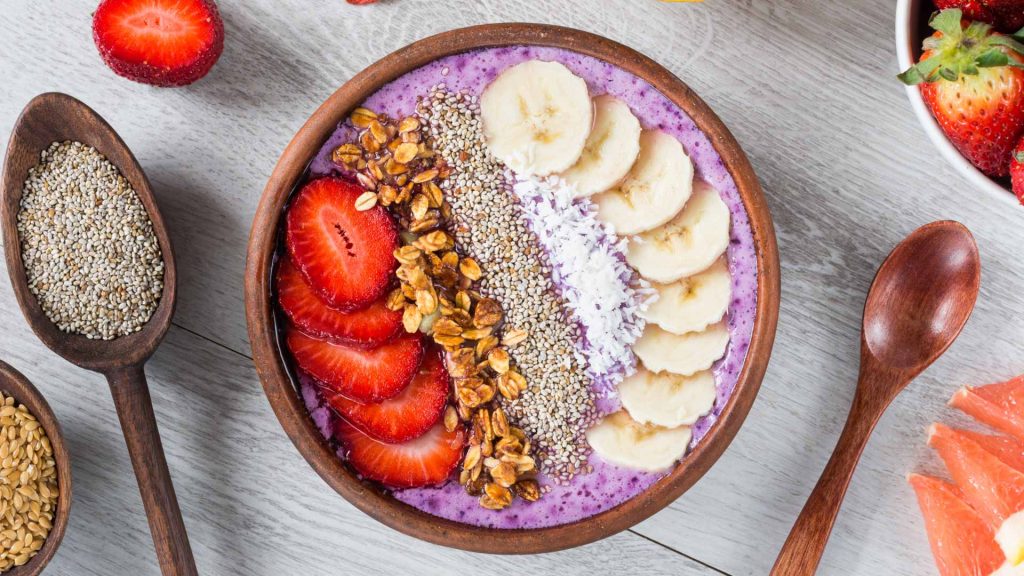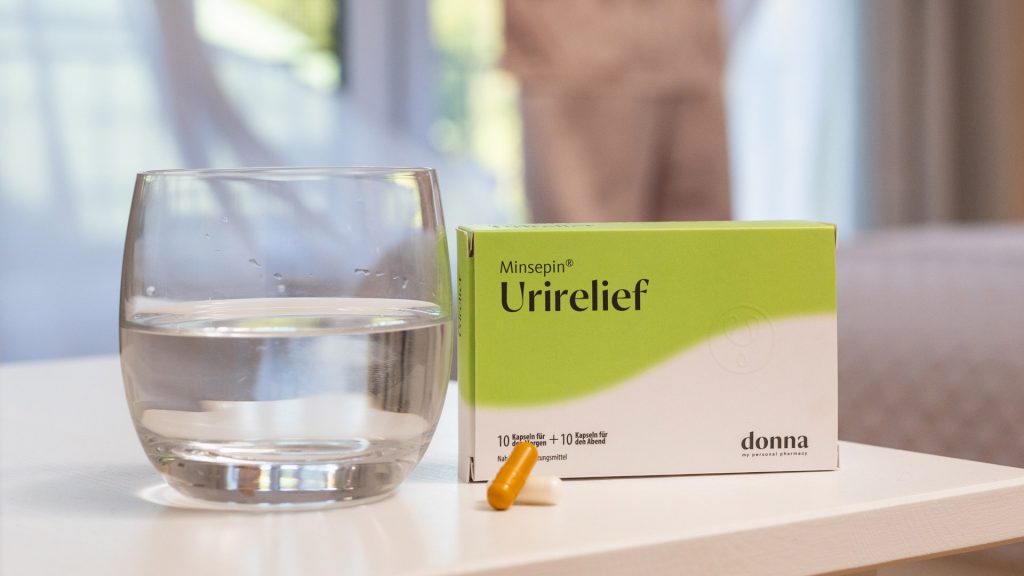The role of diet and nutrition in supporting your urinary health
- READING TIME 5 MIN
- PUBLISHED February 19, 2024
- AUTHOR Donna
Key takeaways
- Proper hydration is a key to urinary health and an important line of defence against urinary tract infections or UTIs. Women+ should aim to drink 2.7 liters of liquids daily and men+ 3.7 liters.
- Berries, leafy greens, citrus fruits and whole grains are some of the foods that promote urinary well-being.
- Including probiotic-rich foods can support a healthy gut balance, which also impacts urinary health and reduces infection risk. On the flip side, caffeine and spicy foods require moderation.
The role of diet and nutrition in supporting your urinary health
Urinary health starts and ends with a proper diet. There is an intricate relationship between what you eat and drink and the optimal functioning of your urinary system. With this in mind, here are some of the tips and guidelines that will help you stay on top of your (urinary) game.
Drink enough liquid, ideally water
Staying hydrated is crucial for keeping your urinary system strong. By drinking enough liquid, preferably water, you maintain a good condition of the mucus barrier and increase the urine flow, which helps flush bad bacteria out of the body, reducing the risk of urinary tract infections (UTIs).1 Water also plays a key role in supporting your kidneys’ job of filtering blood and removing waste while preventing the formation of kidney stones.2
The daily water intake depends on the individual; however, general guidelines prescribe 3.7 liters for men+ and 2.7 liters for women+. This can translate into up to 1.5 liters of plain water, while you can get the rest from drinking tea and juice or eating water-rich fruits and vegetables.

Nourishing the urinary system through diet
You should also support your urinary health through what you eat. Berries, including blueberries, strawberries and raspberries, for example, are not only delicious but also packed with antioxidants known for combating inflammation in the urinary tract.4
A systematic review and meta-analysis of seven controlled trials found that women+, who are typically more susceptible to infections, experienced a 26 percent reduction in the risk of UTIs if they ate cranberries.5 What’s their secret? Proanthocyanidins, chemicals that give the fruit its vibrant color, can prevent bad bacteria, like E. coli, from adhering to the urinary tract lining. Meanwhile, antioxidants, which can also be found in abundance in berries, combat oxidative stress and inflammation in the urinary tract, promoting overall well-being.
Leafy greens like spinach, kale and Swiss chard are all great sources of vitamins A and K, supporting the urinary system, while vitamin C found in citrus fruits such as oranges, lemons and grapefruits, inhibits bacterial growth.6
Stock up on whole grains like brown rice, quinoa and oats to ensure a good dose of fiber and B vitamins which promote digestive health and support the urinary system by preventing constipation.7 Cruciferous vegetables, including broccoli, cauliflower and Brussels sprouts, are also packed with all kinds of micronutrients and compounds that may assist in detoxifying the body, potentially reducing the risk of urinary issues.
Let’s not forget the watermelon, with its high water content which contributes to overall hydration but also contains lycopene, a powerful antioxidant.8 Meanwhile, nuts and seeds such as almonds, flax seeds and sunflower seeds are brimming with vitamin E and healthy fats, again offering antioxidant protection to cells in the urinary system.9
Finally, try to include food rich in probiotics to promote a healthy balance of gut bacteria, which is also linked to urinary health.10

Balancing electrolytes and minerals
Maintaining a proper balance of electrolytes and minerals is another building block for supporting urinary health, as well as preventing kidney stones.11 Electrolytes are essential for fluid balance, nerve signal transmission and muscle contractions, while minerals like potassium regulate fluid balance, blood pressure and pH of urine, preventing calcium-containing kidney stones.
Magnesium, too, helps reduce certain kidney stones by binding to oxalates in the digestive tract.12 Oxalates are naturally occurring compounds in plants that help form calcium oxalate and can potentially increase the risk of kidney stones in some people.13
Foods to avoid
Considerations for urinary health extend beyond what to include in your diet; it’s equally important to be mindful of what you should avoid.
Caffeine, juice, tomatoes and carbonated drinks, for example, should be moderated because of their potential effects on bladder function and acidity.14 Spicy foods containing capsaicin may also aggravate the bladder15 , which means you should enjoy them in moderation or explore milder options.
Practical healthy tips include drinking enough water, gradually reducing caffeine intake if necessary, using a “bladder diary” to identify specific triggers and speaking with your doctor for personalized advice.
A bit of effort today for a healthier tomorrow
By embracing the right dietary choices, you will pave the way for a healthier urinary system, which also means supporting your overall well-being. It’s worth noting that even small changes made today can make a big difference tomorrow.
And to make sure your urinary health truly remains in tip-top condition, consider Donna’s specially formulated supplement. MINSEPIN URIRELIEF includes a combination of D-mannose, common heather, silver birch and berberine.16, 17 All these substances include properties that support your urinary health and may offer relief from discomfort caused by uncomplicated UTIs. Jump over to our dedicated page to find out more.

REFERENCES
- https://www.sprintdiagnostics.in/blog/preventing-urinary-tract-infections
- https://www.kidney.org/content/6-tips-be-water-wise-healthy-kidneys
- https://www.health.harvard.edu/staying-healthy/how-much-water-should-you-drink
- https://www.everydayhealth.com/diet-nutrition-pictures/amazing-health-benefits-of-berries.aspx
- https://pubmed.ncbi.nlm.nih.gov/29046404/
- https://www.ncbi.nlm.nih.gov/pmc/articles/PMC6783857/
- https://www.ncbi.nlm.nih.gov/pmc/articles/PMC8825222/
- https://encyclopedia.pub/entry/20497
- https://www.renalandurologynews.com/news/urology/urinary-tract-infections-uti/vitamin-e-may-improve-uti-treatment/
- https://www.ncbi.nlm.nih.gov/pmc/articles/PMC7822161/
- https://pubmed.ncbi.nlm.nih.gov/3405611/
- https://pubmed.ncbi.nlm.nih.gov/16100850/
- https://www.medicalnewstoday.com/articles/oxalic-acid
- https://nafc.org/bhealth-blog/the-big-four-bladder-irritants/
- https://www.healthdigest.com/888903/how-spicy-foods-impact-your-bladder/
- https://nutritionj.biomedcentral.com/articles/10.1186/s12937-022-00769-x
- https://aliveda.com/en/the-antimicrobial-properties-of-berberine-and-its-role-in-urogenital-health/
RELATED ARTICLES
Explore more
Feed your curiosity with more content. Dive deeper and explore our selected articles, curated just for you.



